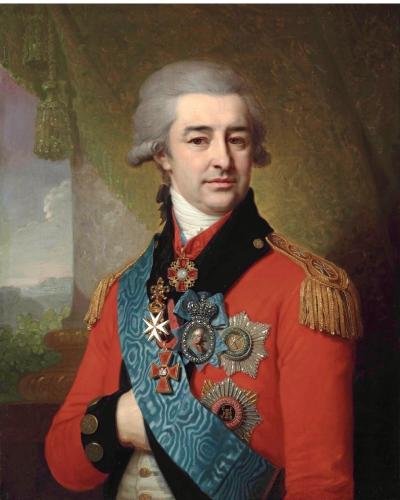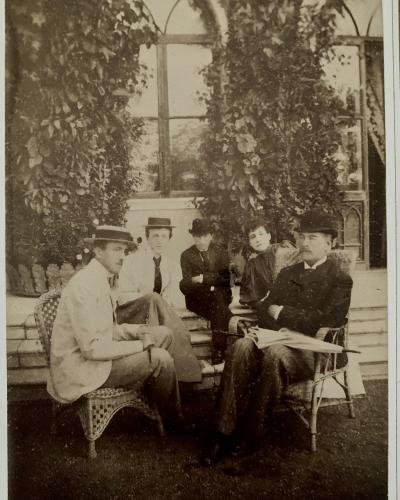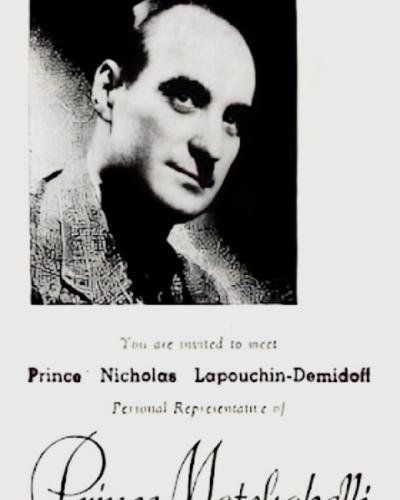The Lopukhin-Demidov family is an ‘old’ Russian noble family whose ancestors include the first wife of Peter the Great, Tsarina Eudoxia Fyodorovna Lopukhina (1669-1731). The family’s fortunes importantly improved during the reign of Tsar Paul I, when the eldest daughter of the talented bureaucrat, Peter Vasilyevich Lopukhin (1753-1827), Anna Petrovna (1777-1805), became the Tsar’s favourite. To keep Anna Petrovna near his court, the Tsar organised for the entire family to move to St. Petersburg with the father given a promotion together with sumptuous new living quarters and additional wealth.
“In reward of fidelity and zeal for service”, Tsar Paul I, by decree dated 19 January 1799, awarded Peter Vasilyevich a princely title and, one month later, the more elevated title, together with all of its privileges, of ‘His Serene Highness Prince’. Soon thereafter, on 11 March 1799, the Tsar gifted Peter Vasilyevich the ‘Poniatowski Estate’ of Korsun, which is located in the Kyiv province, and that consisted of a landscaped park of 97 hectares located on three islands. This was a colossal estate that generated an annual income of 200,000 roubles. Tsar Paul I had purchased the estate from the nephew of the Polish King explicitly for presentation to HSH Prince Peter Vasilyevich Lopukhin.
HSH Peter Vasilyevich would go on to serve successive Tsars commencing with Tsar Alexander I on his accession in 1801. However, following decades of loyal service, the last ten of which were spent serving as the head of the Committee of Ministers and of the State Council, an exhausted HSH Peter Vasilyevich on 2 November 1826 tendered his resignation to Tsar Nicholas I. Despite suffering from ill health and advanced years, the Tsar rejected the offer considering his administrative talents indispensable for the country. The prince died soon thereafter in 1827.
HSH Peter Vasilyevich had only one son, Paul Petrovich Lopukhin (1790-1875), who, understanding the fortune that awaited him is said to have “enthusiastically indulged in the wildest life”. However, this lifestyle did not restrain him from achieving a highly successful military career. During the reign of Tsar Alexander I, he served in the Cavalry Regiment, participated in the war with France of 1806 to 1807, fought against Napoleon’s invasion in 1812, as well as in the foreign campaigns of 1813 - 1814, to cite only a few of his numerous military accomplishments.
In terms of romantic interests, he had only one true love, Anna Ivanovna Alopeus (1786-1859), the faithful wife of David Maksimovich Alopeus (1769-1831). Paul Petrovich Lopukhin would remain unmarried so long as he could not marry Anna Ivanovna. He had originally met the ‘famous beauty’ in January, 1808, in St. Petersburg, fell in love, and remained faithful for the next sixty years. On the passing of Anna Ivanovna’s husband in 1831 in Berlin, HSH Paul Petrovich hastened to Anna Ivanovna who agreed to his proposal of marriage. They were by now a charming but aged couple.
The wedding took place on 30 October 1835 at the Russian Orthodox Church of Villa di San Donato, the grand palace, located near Florence, of his cousin, Anatole Nikolaevich Demidov (1813-1870). The witnesses included Prince A.M. Gorchakov, Z.A.Khitrov, and G.F. Orlov. After the wedding, the couple journeyed to settle at the prince’s imposing Korsun estate in the Kyiv province.
It was at his Korsun estate where he spent the final part of his life and where he added to the palace complex an archaeological museum, a large library, a choir for the chapel and even a symphony orchestra where famous musicians were invited to perform. According to Prince Alexey Borisovich Lobanov-Rostovsky (1824-1896), the prince in 1869 was “a cheerful and fresh old man, extremely kind in his manners, in our generation we have already become unaccustomed to such treatment. Without exaggeration, we can say that Prince Lopukhin is a type of old Russian master, in the fullest and most worthy sense of the word. Despite his advanced years, he retained all the freshness of his memory, his conversations constantly reflected his truthfulness and conscientiousness,” while “the old man loved to tell jokes that were not entirely decent”. In the large hall of the palace, concerts were performed every Saturday evening that, at times, included pieces composed by the prince that he himself would conduct.
He was also a talented and effective administrator of his huge territory. He competently resolved misunderstandings and commercial disputes as well as establishing schools, hospitals, churches and almshouses. He passed away at his Korsun estate on 23 February 1873.
However, the passing of the childless, HSH Paul Petrovich, did not bring an end to the title ‘His Serene Highness Prince Lopukhin’. In recognition of the family’s invaluable service to country and to successive Tsars, Tsar Alexander II, by decree of 30 May 1873, transferred the princely title and surname to the eldest grandson of HSH Prince Lopukhin’s sister, HSH Princess Ekaterina Petrovna, so to Colonel Nikolai Petrovich Demidov (1836-1910). He would now style himself, 1st Prince Lopukhin-Demidov. The title would then pass to the eldest male descendant who henceforth would be named, ’His Serene Highness Prince Lopukhin-Demidov’.
The Kyiv Noble Deputy Assembly duly included ‘His Serene Highness, Colonel Lopukhin-Demidov’, in the 5th part of the Noble Genealogy Book, where representatives of titled families were formally recorded.
By the time he received the title of ‘His Serene Highness’, Nikolai Petrovich Demidov was 37 years old. Like his relations, he was a military man rising in rank in 1880 to Major General. In May 1890 he enlisted in the Army Cavalry Reserve and was promoted to Lieutenant General. He married Olga Valerianovna Stolypina (1841-1926), daughter of retired guard, Colonel Valerian Grigorievich Stolypin, and his wife, Varvara Alekseevna, née Bakhmeteva. They had two sons, Lev Nikolaevich (1868 - 1909) and Alexander Nikolaevich (1870-1937) and two daughters, Elizaveta Nikolaevna (1864-1941) and Vera Nikolaevna (1871-1919).
Unfortunately, the commercial affairs of the Korsun estate suffered as a result of unscrupulous business practices on the part of irresponsible business managers. In order to offset resultant recurring losses, HSH Nikolai Petrovich was forced to assume large quantities of debt. In 1897, he was once more extended a loan, this time amounting to 2,500,000 roubles, which was secured on the estate that was valued at 4,167,000 roubles. Unfortunately, this additional liquidity proved insufficient to reverse the persistent losses placing ownership of the estate in jeopardy.
In 1901, he petitioned the state for guardianship over his estate in order to secure the additional time necessary to pay off his debts. This was approved taking into account “the exceptional properties belonging to Lopukhin-Demidov, the historical significance of the estate granted to the petitioner’s family by Tsar Paul I, and the importance of protecting the inviolability of this large property, the transfer of which, if fallen into the wrong hands, could adversely affect the interests of the local peasant population”.
On 5 December 1910, HSH, Colonel Nikolai Petrovich Lopukhin-Demidov passed away from heart disease in the Korsun estate where he was buried on 9 December. His widow, Princess Olga Valerianovna, filed a petition with the state to maintain guardianship over the property of her late husband. She would continue to live in Korsun together with her unmarried daughters, Elizaveta Nikolaevna (known as Lily) and Vera Nikolaevna.
The title would now pass to Alexander Nikolaievich (1870-1937) who, by this time in 1910, had four of his eventual six sons: Prince Nikolai Alexandrovich (who would become 3rd Prince Lopukhin-Demidov) (1904-1995), Alexander Alexandrovich (1905-1982), Sergei Alexandrovich (1906-1995), Andrei Alexandrovich (1908-1911), Georg Alexandrovich (1914-1968) and Peter Alexandrovich (1916-1998). In 1942, Peter Alexandrovitch would formally change his name to Pekka Tammipuu.
With the onset of the Bolshevik revolution, HSH Prince Alexander Nikolaievitch on 23 May 1917 had no choice but to move his family to safety eventually settling in Finland. He purchased Anttolanhovi manor in Anttola, that today is located in South Savonia (Etelä-Savo) in the southeastern lake district of Finland. At this site, the prince constructed the Anttolanhovi manor house, that continues to stand to this day, and to serve as a possible refuge for Tsar Nicholas II that, of course, would never be used.
To their new dwelling were transported dozens of purebred horses and dogs from the Korsun estate. A number of grooms, huntsmen, poultry keepers, and servants were also hired. The three older boys were sent to study at a boarding school in England, where they learned English, German and French in addition to Russian and Finnish.
The Lopukhin-Demidov family were warmly received in Finland due, in part, to the family connection with Aurora Demidova Karamzina, who was widely known in Finland as a result of her generous philanthropic work and contributions. Unfortunately, in the 1930s, financial challenges once more afflicted the Lopukhin-Demidov family. They were forced to part with their estate in Anttola and move to Hämä, the estate of the princess’s parents. Unfortunately, this move also proved unsuccessful as a result of large unpayable debts that once more placed this dwelling at peril of loss.
On 2 December 1937, HSH Prince Alexander Nikolaievich Lopukhin-Demidov fell from a sleigh, that was loaded with hay, and suffered a serious head injury. He died on 6 December at the age of 67 in Vyborg where he is buried (from 1918 to 1940 the city was part of Finland and held the name Viipuri). His spouse, Princess Natalia Dmitrievna Naryshkin (1886-1957), during the Russian-Finnish Winter War of 1939-1940, fled from Vyborg to Mikkeli where she lived until her death on 8 October 1957.
It would be their son, Nikolai Alexandrovich Demidov, who would now become the 3rd Prince Lopukhin-Demidov (1904–1995). From the early age of sixteen, Nikolai Alexandrovich worked to earn a living. At first, he was a customs officer before moving to live with relatives in France. In 1926, he moved to the United States where he became one of the earliest émigrées to work for Prince Georges Vassilievitch Matchabelli (1885-1935), a Georgian prince. Prince Matchabelli had earlier emigrated to the United Sates following the Bolshevik revolution eventually starting a perfume business in New York City. Nikolai Alexandrovich joined the company when it occupied one small room with the personnel consisting of only Matchabelli, a secretary and a stenographer. It would be Nikolai Alexandrovich who worked to ‘compose’ the blends of perfume following the passing of Matchabelli in 1935. It was a job that he would successfully fulfil for nearly half a century ending only with his retirement. Nikolai Alexandrovich would marry twice, the first to Paola Borschevskaya and the second to Lorna Taylor, née Barnes. He died in New Hampshire on 28 September 1995. There were no children from either marriage so the title then passed to the family of his brother, Alexsander Alexsandrovich (1905–1982) who was born and lived in Finland. His son, Yrjö Onni Johannes Demidov, then became 4th Prince Lopukhin-Demidov (1936–2018) and it his son, Nikolai Alexander Paul Demidov, who is the current 5th Prince Lopukhin-Demidov (1976– ). The European Demidoff Foundation are proud and delighted to have on its Board of Directors a direct descendant of this noble Russian family, Kristiina Helmi Natalia Demidoff.






